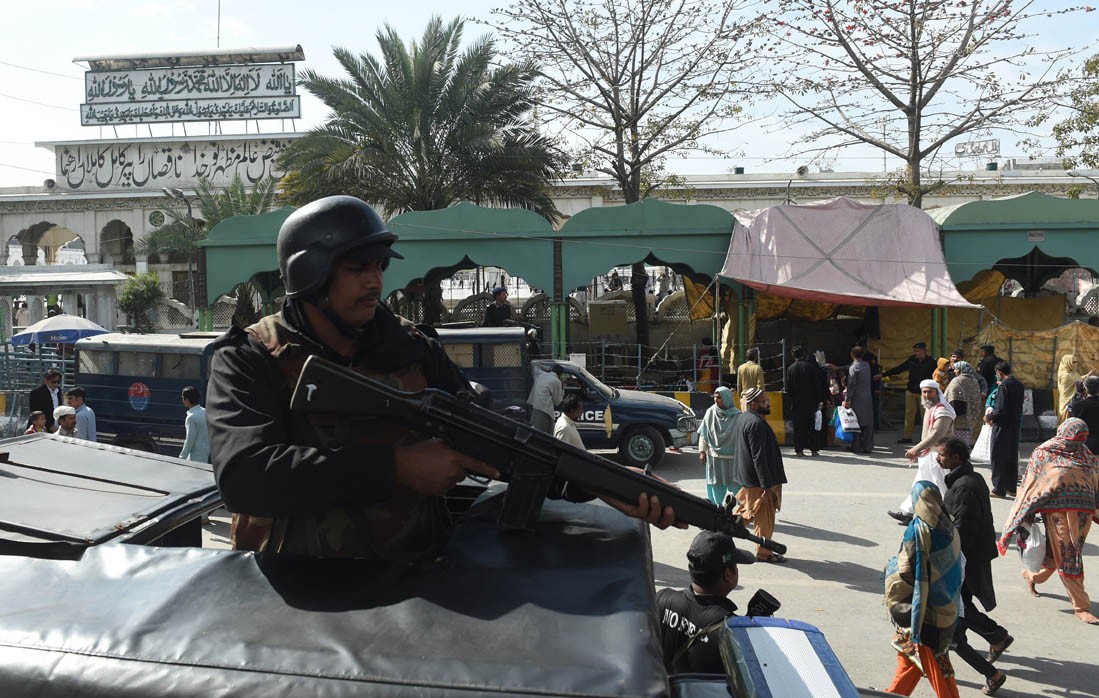
The shrines of Bibi Paak Daman and Shah Jamal were recently closed to the visitors, following the deadly blast at Sehwan Sharif. Could there be a better solution to the security issue?

Shrines are a symbol of hope for the zaireen (or devotees), especially the destitute and dejected. They come to the shrines of different Sufi saints, looking for solace and a peace of mind. Here they say prayers, receive langar (charity food), and also often perform dhamal -- a kind of frenzied dance that takes them into a trance-like state, as the whirling ritual, which is set to the beat of dhol, reaches a crescendo, and they feel one with the divine spirit.
The message advocated by the Sufi saints was that of love for the humankind, regardless of caste, creed and religion. Tens of thousands of devotees -- men, women, eunuchs -- routinely visit the shrines. Their devotion is disregarded by certain extremist groups and considered a threat to their own religious brand. Such groups often target the innocent visitors in order to spread terror. The deadly attack at Lal Shahbaz Qalandar in Sehwan, Sindh, which killed more than 80 people, is one recent example of the ruthlessness of these elements. Lahore saw a similarly dreadful incident in 2010, when twin bombs exploded inside the Data Darbar complex, leaving many dead in its wake. Incidentally, the attacks in both the cases were made on a Thursday, which is considered to be a holy day for the devotees.
Sehwan Sharif’s attack has unleashed a new wave of terror in the city itself. As a result, the shrines of Bibi Paak Daman and Shah Jamal were closed to the visitors for at least one day.
Could there be a better solution to the security issue? What measures the concerned authorities are taking in this regard? According to Asif Ijaz, Assistant Director, Auqaf and Religious Department, Punjab, the shrines have been provided with guards, metal detectors and walkthroughs, in the first place.
"We have created multiple security layers that can filter the miscreants," Ijaz tells TNS. "Besides, special measures have been taken to make the shrines of Ali Hajveri, Bibi Paak Daman, Shah Jamal and Mian Mir safe."
Ijaz is quick to add that these shrines may be closed anytime in the event of a threat of a terrorist attack.
There has been an inevitable fallout. The number of visitors to the shrines in Lahore has dropped majorly over the past week or so, says Tahir Masood, Manager Auqaf, Data Darbar.
"Earlier, the place would receive over 50,000 people in a week’s time. Today, the number has come down to 15,000. Auqaf generates revenue from the financial contribution that is made by the visitors. Low turnout obviously means lesser income."
Masood remembers that following the 2010 twin blasts at the Darbar, nine of the place’s 15 gates were closed. Now, there are only two entry points available to the zaireen (or devotees). This creates problems for the visitors.
Masood reveals that Closed Circuit Television cameras have been installed at the shrines of Ali Hajveri, Baba Fareed, Sakhi Sarwar, Shah Rukn-e-Alam, Bahaudin Zikrya, Shah Shams Tabraiz, Musa Pak, Shah Jeewna, Baba Bulleh Shah, Jalal-ud Surkh Posh, Peer Makki, Bibi Paak Daman, Mian Mir, and Shah Jamal. Data Darbar alone has been equipped with 100 CCTV cameras.
"The 536 smaller shines, which also fall under the Auqaf Department, are expected to get security paraphernalia very soon," he adds.
Muhammad Hussain, a police official who is in charge of security at the Darbar, says that 46-odd cops have been deployed at the shrine in order to provide foolproof security and safety to the devotees. "They [the cops] are vigilant and ready to fight any untoward situation," he claims. "No visitor can enter the place without being properly frisked."
However, Hussain admits that it may be difficult to stop a suicide attacker. "But it is important that the terrorist networks are busted, with the help of intelligence sharing."
It is a sad fact that the poor who would get their day’s meals at the langar of Bibi Paak Daman suffered after it was closed. Nazir, a malang, who is dressed in untidy clothes, sits far away from the gate of the shrine, seemingly yearning for food. Additionally, the more affluent visitors would give him some alms also.
"I’ve nothing to eat," he says, in a low tone. "I am forced to go round begging for food. But all I get is ridicule and abuse."
The business of cooked food like rice, daal haleem, naan chana etc has also been affected severely at these shrines. The people who would earlier sell these popular food items to those visitors who could afford them are facing losses.
The incidents have struck fear in the hearts of the common people. Ali Hussain, a frequenter at Data Darbar, says: "I am not afraid of visiting the place. I am not afraid of death. Sarkar (Data sahib) will protect me and my family. Data’s love brings me here, no terrorist can kill this spiritual bond!"
Another devotee sounds a similar note. "I visit different shrines of the city, with my family members, and we aren’t afraid of death."
Allama Waqar Hussain Naqvi, a religious cleric, is of the view that Pakistan is a victim of sectarian hatred that led to the attacks on Sufi shrines and Imambargahs also. "There is a disillusioned group that brands everybody other than those subscribing to their ideology as infidels.
"The Imambargahs and shrines are easy targets for the extremists and terrorists."